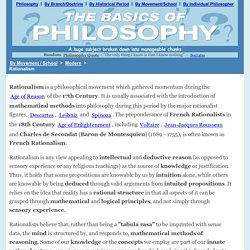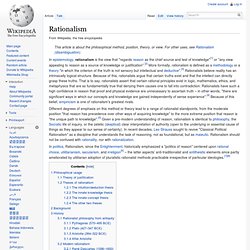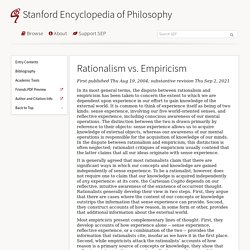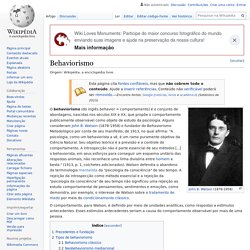

As diferenças entre inatismo, empirismo e construtivismo e as ideias dos seus principais autores. TEORIAS DA APRENDIZAGEM (PARTE1) Empirismo x Inatismo x Racionalismo x Behaviorismo. Mapa empirismo. Rationalism - By Movement / School. Rationalism is a philosophical movement which gathered momentum during the Age of Reason of the 17th Century.

It is usually associated with the introduction of mathematical methods into philosophy during this period by the major rationalist figures, Descartes, Leibniz and Spinoza. The preponderance of French Rationalists in the 18th Century Age of Enlightenment, including Voltaire, Jean-Jacques Rousseau and Charles de Secondat (Baron de Montesquieu) (1689 - 1755), is often known as French Rationalism. Rationalism is any view appealing to intellectual and deductive reason (as opposed to sensory experience or any religious teachings) as the source of knowledge or justification.
Thus, it holds that some propositions are knowable by us by intuition alone, while others are knowable by being deduced through valid arguments from intuited propositions. Baruch Spinoza expanded upon Descartes' basic principles of Rationalism. Racionalismo e Empirismo - Diferenças, Características e Resumo. Saber qual a diferença entre racionalismo e empirismo é fundamental para não confundir essas escolas de pensamento e distinguir melhor as matérias estudadas, sobretudo na área de humanas.

Para ficar por dentro de todos os detalhes desses conceitos, basta acompanhar nosso post. O que é racionalismo? Para a abordagem racionalista, o conhecimento tem sua fonte na razão, sendo que tal conhecimento é inato e independe de experiências sensoriais. Um exemplo clássico do racionalismo é o estudo da matemática, no qual 1+1 = 2. Ou seja, não são necessárias experiências sensoriais para chegar a esse raciocínio. Para o racionalismo, o conhecimento inato consiste em um conhecimento de ordem superior que dá acesso a uma verdade profunda que vai além do que conhecemos no cotidiano. O que é empirismo? Já de acordo com o empirismo, os conhecimentos dos seres humanos são provenientes da experiência sensória (relacionada aos sentidos). Essa abordagem possui dois princípios básicos, que são: Rationalism.
In epistemology, rationalism is the view that "regards reason as the chief source and test of knowledge"[1] or "any view appealing to reason as a source of knowledge or justification".[2] More formally, rationalism is defined as a methodology or a theory "in which the criterion of the truth is not sensory but intellectual and deductive".[3] Rationalists believe reality has an intrinsically logical structure.

Because of this, rationalists argue that certain truths exist and that the intellect can directly grasp these truths. That is to say, rationalists assert that certain rational principles exist in logic, mathematics, ethics, and metaphysics that are so fundamentally true that denying them causes one to fall into contradiction. Philosophical usage[edit] Rationalism is often contrasted with empiricism. Theory of justification[edit] The theory of justification is the part of epistemology that attempts to understand the justification of propositions and beliefs. The other two theses[edit] Rationalism vs. Empiricism.
1.

Introduction The dispute between rationalism and empiricism takes place within epistemology, the branch of philosophy devoted to studying the nature, sources and limits of knowledge. The defining questions of epistemology include the following. What is the nature of propositional knowledge, knowledge that a particular proposition about the world is true?
To know a proposition, we must believe it and it must be true, but something more is required, something that distinguishes knowledge from a lucky guess. The disagreement between rationalists and empiricists primarily concerns the second question, regarding the sources of our concepts and knowledge. 1.1 Rationalism To be a rationalist is to adopt at least one of three claims. The Intuition/Deduction Thesis: Some propositions in a particular subject area, S, are knowable by us by intuition alone; still others are knowable by being deduced from intuited propositions. Mito de la caverna - Platón. O que é Inatismo? Explicação Rápida. Constructivismo (pedagogía) Behaviorismo. O comportamento, para Watson, é definido por meio de unidades analíticas, como respostas a estímulos antecedentes.

Esses estímulos antecedentes seriam a causa do comportamento observável por mais de uma pessoa. Precedentes e fundação[editar | editar código-fonte] Ivan P. Pavlov (1849-1936) Como precedentes do comportamentalismo podem ser destacados os fisiólogos russos Vladimir M. Bechterev, grande estudioso de neurologia e psicofisiologia, foi o primeiro a propor uma Psicologia cuja pesquisa se baseia no comportamento, em sua Psicologia Objetiva.[1] Pavlov, por sua vez, foi o primeiro a propor o modelo de condicionamento do comportamento conhecido como reflexo condicionado, e tornou-se conceituado com suas experiências de condicionamento com cães. Thorndike foi o criador da lei do efeito. Tipos de behaviorismo[editar | editar código-fonte] Não há acordo amplamente e rigorosamente aceito sobre a presente classificação.
Behaviorismo clássico[editar | editar código-fonte] Edward C. Clark L. BEHAVIORISMO (1): METODOLÓGICO E RADICAL.